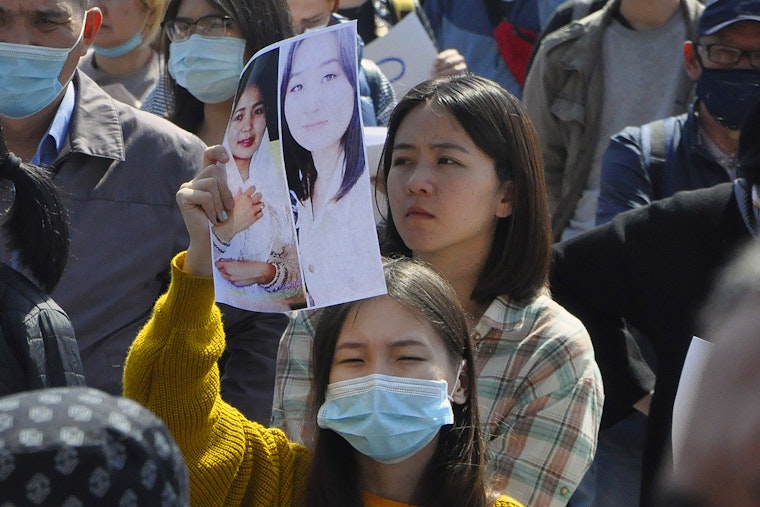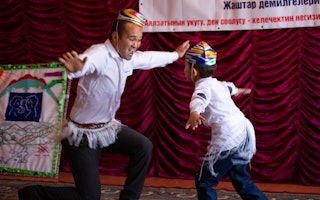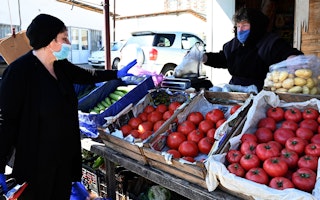Q&A: Femicide in Kyrgyzstan

A total of 762 murders of women were registered in Kyrgyzstan over the past 10 years. No one knows how many were unregistered. This is just one of the shocking facts revealed in the first comprehensive study of femicide in Kyrgyzstan by the investigative reporters at Kloop Media, whose work won a Sigma Award, the international data journalism competition, this year. The Kloop journalists found that women in Kyrgyzstan are most often killed by their husbands, lovers, or partners for simply not doing household chores. Open Society’s Elina Turalyeva spoke to Anna Kapushenko and Savia Hasanova, journalists at Kloop Media, about their research.
Tell us about your research on femicide in Kyrgyzstan
Femicide is the killing of women, usually committed by men. It is a gender-based hate crime—and, sadly, a widespread and underreported problem in Kyrgyzstan. We started our research in the fall of 2020 after a number of violent incidents in Kyrgyzstan that resulted in femicide. That year, during a peaceful march against gender-based violence on International Women’s Day, we among other female activists were attacked by a group of men, after which we were illegally detained.
The COVID-19 pandemic also significantly escalated threats to women’s safety and security. Domestic violence dramatically increased by 65 percent during the lockdown; 95 percent of the victims were women. Simple things such as not washing the dishes or not cooking dinner may be fatal for women in Kyrgyzstan.
We got inspired by the 2019 research project femicid.net, the first project that systematically collects data on femicide in Russia, dedicated to anti-femicide initiatives started by feminist activists in Russia. The independent project collects and openly publishes data on femicide, and raises awareness about the problem through research, lectures, media, art, and support for the anti-femicide movement. Inspired by their methodology, we decided to conduct our own research of femicide prevalence in Kyrgyzstan as there was no such research conducted before. We analyzed crime news from 2008 to 2010, and found about 300 murders of women by men, but there are likely more cases of femicide.
What is the situation in Kyrgyzstan like for women today?
The majority of femicide cases are egregiously brutal. One of the cases involved a husband pouring gasoline over his wife and setting her on fire. The woman died of severe burns. In September 2020, a 47-year-old man stabbed his wife to death for not cooking dinner that day. In June 2020, a video circulated on social media of a husband tying car tires filled with bricks to his wife’s neck while repeatedly slapping her and pouring buckets of cold water on her as a punishment. A more recent case of horrific abuse, reported in September 2021, involved a 28-year-old man torturing his pregnant wife with a red-hot iron. These two cases have not resulted in femicide but are more likely to be “unfinished femicides.” There are many more untold stories with sad endings.
Unfortunately, cases involving domestic violence are underreported; when they are reported, they are often dropped and never reach the court. The most “ruthless” sentence passed upon abusers is a fine, often paid by the woman’s family, that goes into the state budget. This means that a woman subjected to violence first files a complaint with the police and then pays the fine for being beaten. This is incredibly unfair, but this is the situation in Kyrgyzstan today.
What are the barriers to change?
While society is gradually recognizing and understanding the term “femicide,” the state seems to ignore the problem. Kyrgyz law enforcement agencies do not have a single electronic database of these statistics and upon our request for information, they prepared the data manually. The Ministry of Internal Affairs and the Prosecutor General's Office of the Kyrgyz Republic refused to grant us interviews. The state makes no effort to distinguish between femicide and other types of murders.
Domestic abuse is not taken seriously by the authorities nor by the public. It is perceived as an internal family matter that needs no intervention. The issue is rooted in gender stereotypes. In most of the cases, women are accused of becoming a victim while law enforcement agencies justify men’s violent behavior through “loyalty” to “traditions.”
What changes need to be made by law enforcement?
Working with law enforcement agencies is painfully hard. They do not want to acknowledge the issue and do not understand the term “femicide.” If the problem is not addressed, we might witness more of such infamous local cases as the murder of Burulai at the police station and the kidnapping and murder of Aizada.
In Kyrgyzstan, the law enforcement agencies are very male-dominated, and women mostly do paperwork. A gender-balanced composition of state bodies could help to prioritize the issue of domestic violence. We believe that an integrated approach can change the situation. It is important to cultivate social empathy and mindfulness regarding women’s rights, raise awareness among law enforcement agencies and educate women and girls about their rights.
What’s next in your work? Where do you look for hope?
Femicide is an extremely difficult topic to research. We are fueled by the feedback of women who have read our study—it seems to give them hope when they understand that there are other women out there who experience common issues. It gives us strength to continue working on this subject.
Following the publication, women began to share their stories openly on their social media pages and have more faith in themselves. We strongly believe in the importance of our work and plan to continue our research on violence against women and femicide. We plan to use the funds from Sigma Awards for our further research on gender inequality.


